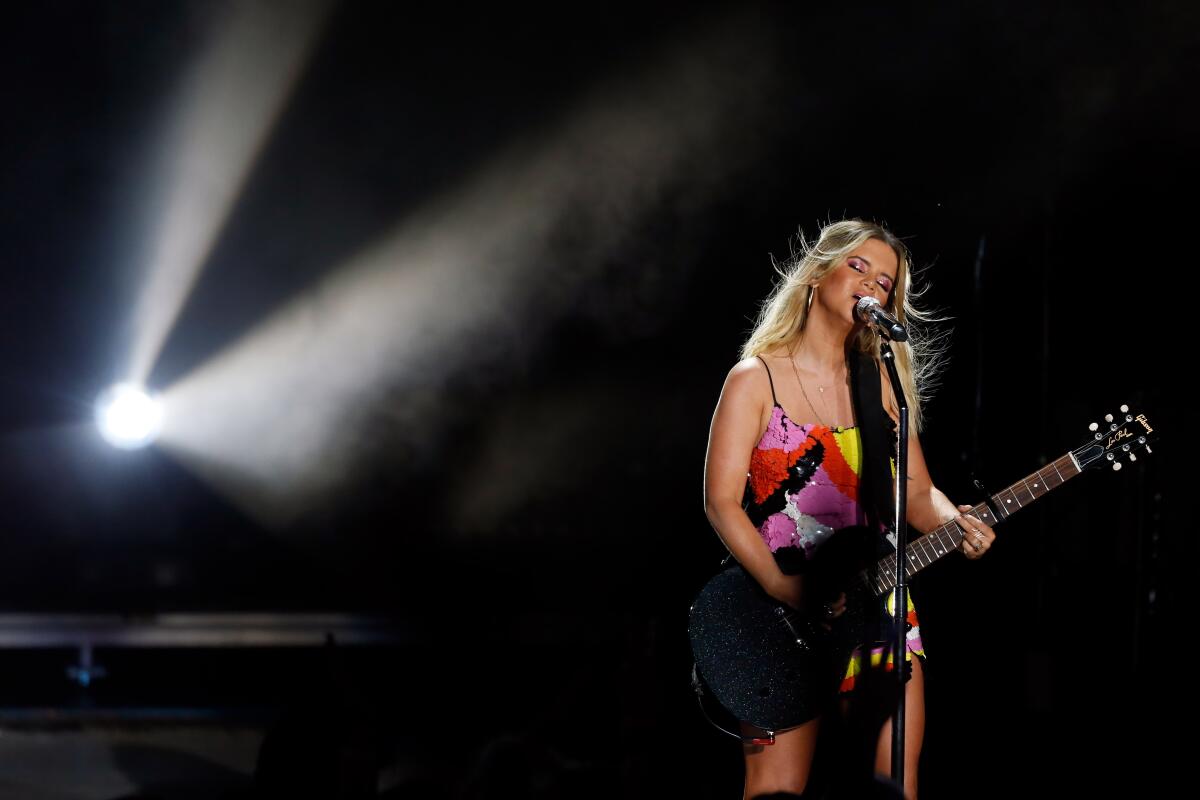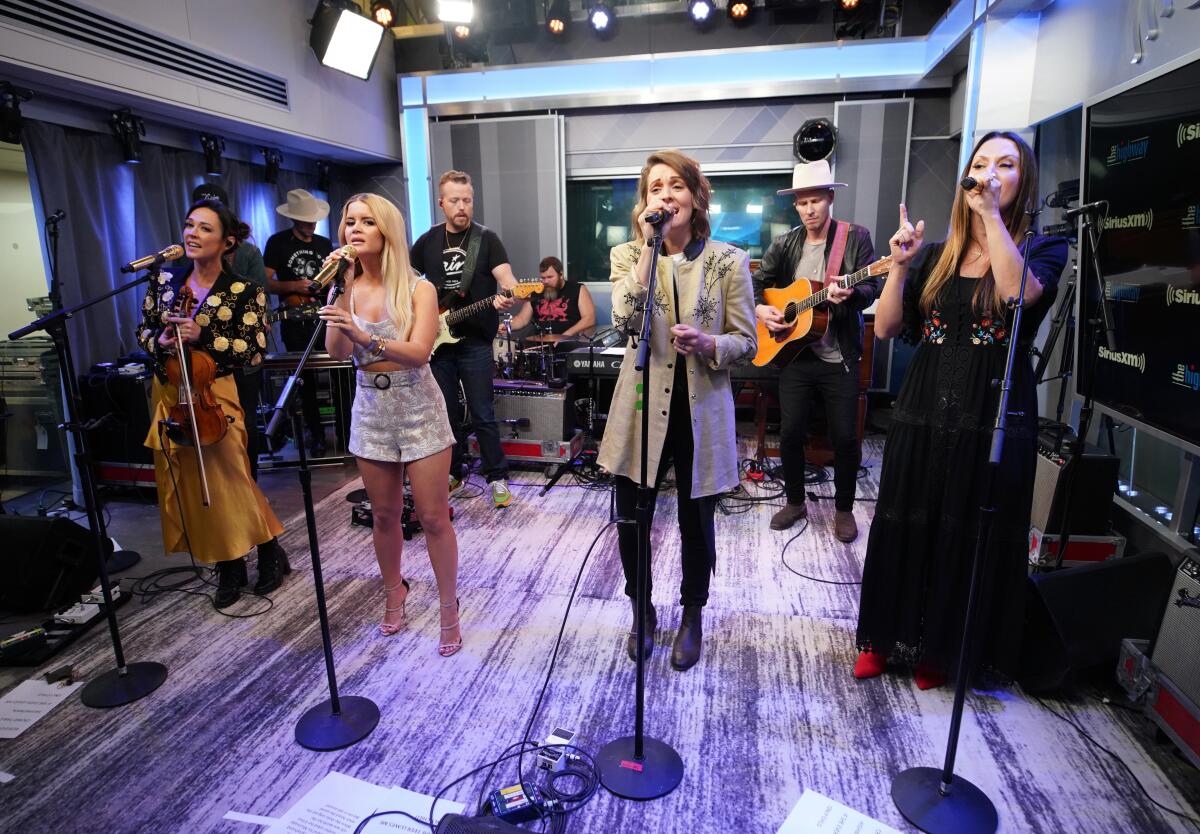In a male-dominated business, Highwomen star Maren Morris is bending country to her will

- Share via
Maren Morris was a Highwoman apart last Saturday night at the Greek Theatre.
Headlining a sold-out date on tour behind her recent solo album, “Girl,” the popular country singer — if that’s indeed how we should think of her — took a moment partway through her show to talk up the other project that’s kept her busy this year: the self-titled debut by the much-discussed roots-music supergroup she shares with Brandi Carlile, Amanda Shires and Natalie Hemby.
“I just love those women so much,” Morris, 29, said of the Highwomen, whose record entered the Billboard country chart this week at No. 1, the first album by a female act to top the chart since “Girl” did it in March. “I’m proud to call them friends, but I still geek out that I get to be in a band with them.”

Yet that night she wasn’t actually with them: As Morris was playing the Greek, Carlile had her own gig Saturday at New York’s Madison Square Garden, where the Grammy-winning folkie ushered Hemby and Shires onstage for a handful of Highwomen tunes that by all accounts brought the house down. (It probably helped that the great Mavis Staples was on hand as well to pitch in on the album’s moving title track.)
Morris’ absence at MSG was of course a mere function of the individual touring schedules that led the singer to joke, “The Highwomen are bicoastal.” But it also pointed up the fact that in many ways Morris feels like the group’s outlier: a proudly commercial artist at once more pop and more country than her comparatively alt-minded band mates.
After her shout-out at the Greek, Morris did the Highwomen’s rustic “Crowded Table,” about creating “a place by the fire for everyone.” Then she followed that with a very faithful rendition of the Cardigans’ mid-’90s disco-bubblegum “Lovefool” — a happy embodiment of the catholic mind-set she describes in “Girl’s” wistful “A Song for Everything” when she invokes an old Katy Perry hit to ask, “What’s your time machine? / Is it Springsteen or ‘Teenage Dream’?”
Country and roots music have known such pop adventurers before. Think Taylor Swift. Before Swift, think Sheryl Crow, who plays bass on “The Highwomen.” Before Crow, think Dolly Parton, who turned up to join the Highwomen at July’s Newport Folk Festival.
But it’s hard to think of another artist who’s simultaneously inhabited both spaces as fully as Morris is doing right now — or who’s done it with as much approval from each space’s power structure.
A Texas native who first found success in Nashville writing for others, Morris established herself as a singer with her 2016 major-label debut, “Hero,” which with its frank talk about sex and religion seemed to capitalize on Kacey Musgraves’ advances as a kind of down-home intellectual. Two years later, “The Middle” — her and Zedd’s blippy stadium-rave smash — revealed a figure with much broader ambitions; the track’s Grammy nods for both record and song of the year suggested she had the support of a pop business accustomed to welcoming country defectors.

Surprisingly, though, that endorsement hasn’t come at the expense of Nashville’s embrace. Morris is up for more trophies than any other act at November’s CMA Awards, with nominations for single of the year (for “Girl’s” title track), female vocalist of the year and album of the year.
The CMA has used that last award as something of a prestige prize to recognize artists at the respectable fringes of country’s mainstream — your Eric Churches and Chris Stapletons, for instance. Last year’s winner was Musgraves’ “Golden Hour,” a critical favorite that’s struggled to attract much interest from the terrestrial radio programmers who still wield enormous power in Nashville.
Yet Morris is a strong presence on country radio at a moment when songs by female artists are spun nowhere near as often as those by men. Over the summer, “Girl” — a fine example of her ability to make the anthemic feel personal, and a savvy bit of cultural temperature-taking — made it to No. 1 on Billboard’s country airplay chart, ending a shutout for women at the top that lasted nearly a year and a half.
All this success in both worlds — expect more Grammy noms when they’re announced in November — doesn’t mean that Morris isn’t better in some modes than in others. Despite its title, “The Middle” showed how capably she could adapt her low, soulful singing to whirring electronic textures; the song avoids the neither-fish-nor-fowl quality that dulls Kane Brown and Marshmello’s “One Thing Right,” to name just one of the country-EDM collaborations to surface in “The Middle’s” wake.
But the slick pop songs on “Girl” are among Morris’ least effective moments, and they sounded no less wishy-washy at the Greek — a scattershot Spotify playlist, basically, come to disappointing half-life. She was far livelier doing stripped-down ballads like “To Hell & Back,” about a respectful lover who “didn’t think I needed saving,” and rowdy honky-tonk numbers like “All My Favorite People,” in which her voice went raw at the edges.
“Crowded Table” sounded great, too, as do the rest of Morris’ tunes on the Highwomen album, especially the lived-in “Old Soul,” with its vivid images of “other people’s shoes” and a Champagne bottle being broken with a sword. Overall, the album might be the best traditional country record we’ll hear this year: an affectionate tip of the cap to the supergroup’s model — that’d be the ’80s-era Highwaymen, with Johnny Cash, Willie Nelson, Kris Kristofferson and Waylon Jennings — that transcends its cutesy concept to say something profound about women’s lives, as in the tender and funny “My Name Can’t Be Mama”:
Today I didn’t listen to the voice inside my head
I peeled out of the driveway, left my family in bed
Know it wouldn’t be easier to just quit the road and stay home
I’d lose myself inside the halls, unsatisfied and alone
As effortlessly modern as she is steeped in heritage, Morris has shown us she can do it all when she wants to. But with the Highwomen she’s drilling deep into a matter-of-fact feminism that questions who benefits when women are tasked with doing just that.
More to Read
The biggest entertainment stories
Get our big stories about Hollywood, film, television, music, arts, culture and more right in your inbox as soon as they publish.
You may occasionally receive promotional content from the Los Angeles Times.











